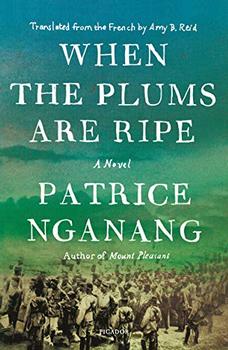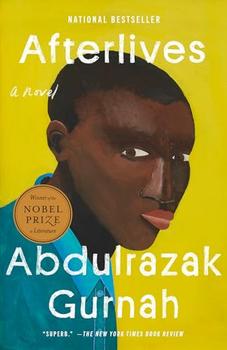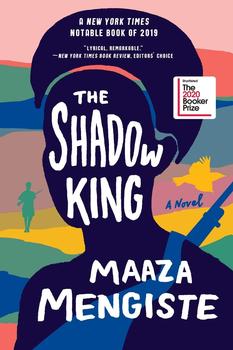Summary | Excerpt | Reviews | Beyond the book | Read-Alikes | Genres & Themes | Author Bio

When the Plums Are Ripe by Patrice Nganang (translated from the French by Amy B. Reid) takes place in 1940s Cameroon, then one of France's colonies. This is Nganang's second novel in an anticipated trilogy (following Mount Pleasant), and a significant addition to the canon of modern African fiction. The books in the trilogy are linked by their focus on the history of Cameroon, not so much on particular characters, so When the Plums Are Ripe can be read as a standalone.
In lyrical prose, the Cameroon-born author, who also is a poet and essayist, draws upon the rich oral traditions of African storytelling and bears clear witness to historical fact. The novel's wry omniscient narrator pays close attention to a vibrant cast of characters indigenous to the West-Central African nation as they find themselves caught between warring factions of French colonial forces after Germany invades France in 1940.
The story begins shortly after the invasion when poet Pouka returns to his ancestral village, Edéa. He has been working for the brutal French colonial administration in the capital, Yaoundé, but city life has become too chaotic for him since war started in Europe.
Upon Pouka's return to Edéa, readers are introduced to a large cast of unforgettable personalities. The hero reconnects with boyhood friends, including his cousin, Hebga, who is a muscular fighter of great reputation. Pouka's father, M'bangue, is a wise and respected diviner, but when M'bangue's magic foretells Hitler's suicide, his status is discredited — nobody can believe that Hitler, conqueror of Europe, would die by his own hand. Villagers and merchants including Ngo Bikaï ("Mother of the Market") and Mininga (mistress of the brothel) are preoccupied with daily rituals, family life, crops. Reconnected with his roots, Pouka hopes to foster community among his people and fulfill his life purpose in the village, which he thought he had left behind for good when he went to the city for studies and work. Inspired, he organizes a poetry club that gathers at Mininga's bar during the mornings; his greatest challenge is to foster basic literacy in a land where the oral tradition prevails.
At the same time, it becomes clear to the world that the Nazis have done the unthinkable — captured and occupied France. Throughout Cameroon, French colonial commanders on opposing sides of the conflict jostle for power. Ultimately, the Free French faction proves victorious over colonial troops loyal to Vichy France, the nation's official government under Nazi rule. Free French authorities start to conscript native men for the war.
Precisely plotted, the novel's dramatic tension heightens as Pouka and his fellow villagers find themselves roped into the global conflict. At first, Pouka and his friends embrace the ideal of helping French Resistance leader Charles de Gaulle and the Allied forces liberate Paris; many of them have dreamed to someday visit France and are eager to attempt to help out however they can. Pouka becomes a translator, while Hebga and other young men (inspired by colonial propaganda or personal rage) join the infantry. Deployment claims a high toll because Black soldiers are used for the worst jobs. News in this era travels slowly, but eventually the people realize that their sons and brothers have become cannon fodder in the deserts of North Africa.
Nganang expertly renders the resulting conflict between French and Cameroon authorities, who are desperate to raise public morale, and everyday colonial subjects, who are reluctant to help fight a war for the benefit of their often-violent French colonizers. In an especially memorable passage, an inflammatory sermon at a Catholic church coerces villagers to contribute funds to Free France's army. The priest gazes at his mostly barefoot congregation and bellows:
'Rather than manufacturing boots with the skin of black people, as Nazi Germany does'—here he paused significantly—'Free France has decided to have her soldiers march barefoot. […] Unless you decide that you will provide shoes for our tirailleurs!'
Nganang also pays close attention to the wartime triumphs and struggles of Edéa's women. Market women act with heroism: collectively clanging their kitchen pans every noon to protest the war; organizing a sex strike; risking arrest. Mininga's ladies of pleasure, on the other hand, experience great stress (e.g., additional customers, lost lovers deployed to far-off areas, food scarcity, judgment by the village's "decent" women). Motivated by passion, Mininga herself bewitches Hebga during erotic interludes, but even love isn't potent enough to prevent Hebga from joining the battlefield. The prostitute Nguet also contributes to Cameroon's future, giving birth after her lover, Bilong, dies in battle. The newborn child is hinted to become the next generation's hope, empowered to forge future liberty for his people.
Nganang vividly portrays what happened when Cameroon became snared in a struggle between Western superpowers. The central message is clear: the colonized people never wanted to be controlled by Europeans, and rarely if ever enjoyed the "Universal Rights of Man" proclaimed by the colonial homeland. Nganang makes strong arguments against both war and colonial conquest. Other themes include the endurance of friendship, brotherhood, twists of fate, and complex powers of women. Plums figure as an emblem of freedom. In season, they are everywhere abundant and everyone enjoys, "the trace of the plum's exquisite, tender blackness that is accessible to all, for such a small price."
When the Plums Are Ripe joins other global fiction now available in translation that illuminates places and cultures often inaccessible to and misunderstood by Western readers. Throughout his work, the poet-novelist traces out glimmers of hope in what he terms the "chiasmus" of war. This novel will likely appeal to readers who enjoy the intellectual scope and enduring, multicultural themes of authors like García Márquez, Murakami, Rushdie, Solzhenitsyn, or Soyinka.
![]() This review was originally published in The BookBrowse Review in September 2019, and has been updated for the
September 2020 edition.
Click here to go to this issue.
This review was originally published in The BookBrowse Review in September 2019, and has been updated for the
September 2020 edition.
Click here to go to this issue.

If you liked When the Plums Are Ripe, try these:

by Abdulrazak Gurnah
Published 2023
From the winner of the 2021 Nobel Prize in Literature, a sweeping, multi-generational saga of displacement, loss, and love, set against the brutal colonization of East Africa.

by Maaza Mengiste
Published 2020
Shortlisted for the 2020 Booker Prize, and named a best book of the year by the New York Times, NPR, Elle, Time, and more, The Shadow King is an "unforgettable epic from an immensely talented author who's unafraid to take risks" (Michael Schaub, NPR).
Give me the luxuries of life and I will willingly do without the necessities.
Click Here to find out who said this, as well as discovering other famous literary quotes!
Your guide toexceptional books
BookBrowse seeks out and recommends the best in contemporary fiction and nonfiction—books that not only engage and entertain but also deepen our understanding of ourselves and the world around us.